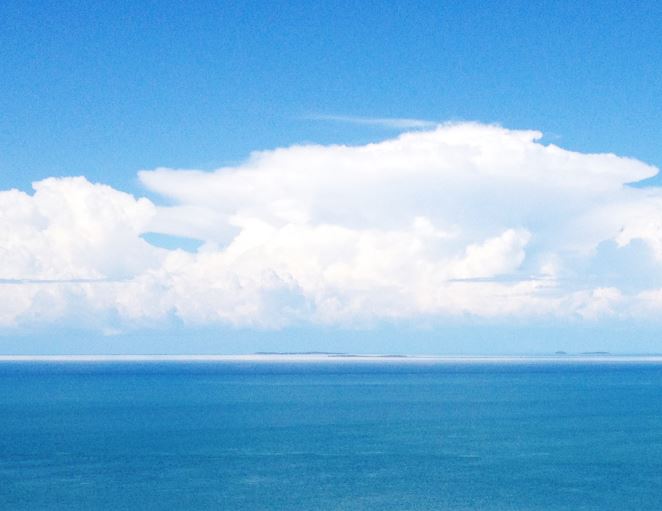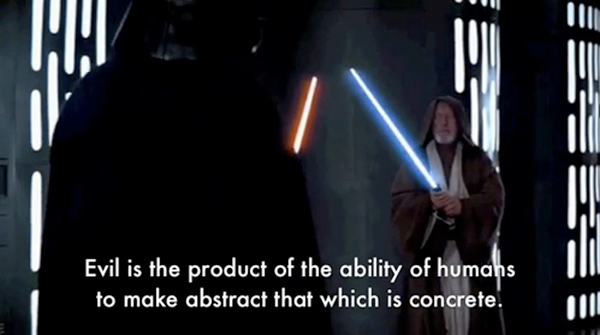An Island
Self reliance is the ability of an individual to be able to function as a productive and balanced human being without being reliant on others. Imagine living in the wilderness or on a remote and uninhabited Island. You have all the tools and resources needed to survive indefinitely. Could you do it? Would you have the emotional strength, the physical fitness and the knowledge and skills needed to survive without outside help? Would you have the spiritual fortitude to overcome the periods of loneliness, self doubt and unhappiness? Being unable to share moments of personal achievement and happiness or having someone to share the burden of suffering would weigh on most people.
Jedi Reliable
The Jedi by nature and training were self reliant while also dependent on each other. Each individual was expected to be able to function effectively as an independent unit. This was critical as the Jedi often worked alone deep in hostile territory with limited support. Jedi were taught the skills needed to be effective. They had the mind set and resilience required to be able to work in isolation cut off from all support. If they got in to trouble behind enemy lines they were often on their own and had to find their own way out.
The Dude in Black
In “Return of the Jedi” we find Luke Skywalker a changed man. The black Jedi Gi made him look different but there was something in his eyes, the way he walked and carried himself. It was compelling.
Some years had passed since Luke confronted the truth of Darth Vader and realized who he was and meant to be. On Dagobah, Skywalker had faced his dark side and purged himself of weaknesses. Desperate to help his friends and driven by the fear of their loss he set out before he was ready. The events that unfolded later changed him forever.
In “Return of the Jedi” Luke has matured. Now a Jedi, he has become self reliant. He is competent and confident. This is apparent by his bearing and command of force powers. Luke can easily get past guards using Jedi mind tricks and can wield a light sabre with all the prowess of a master. But its more than mastery of skill.
In his maturity Luke has become calmer, more at ease within himself and confident in his decisions. Along the way he has lost the reckless and impulsive drive which we saw in the first two installments. The cockiness and impatience of youth are replaced by a humble and self assured resilience and character. Luke Skywalker is beginning to resemble Obi-wan Kenobi in some intangible way.
Growing Pains
Self reliance is something that comes early in some and later in others. For many there is a degree of self reliance but their wings are clipped. They are unable or unwilling to blaze their own trail.
Probably because of my upbringing I was self reliant by the time I was in my teens. My Father’s absence and alcoholism meant being able to look after myself at an early age. I barely had the skills to make it alone but life had taught me to fly early. As soon as I finished high school I flew the nest and I entered into the Army. It was out of the fire and into the frying pan.
Hurry up and Wait
The Army thrives on a paradox of inconsistent consistency. Nothing makes sense till it does. The strange thing about the Army is they teach you self reliance but preferred you didn’t have it. They want you dependent. We were taught the importance of improvisation and initiative but then punished when we used it. Skills and knowledge were drilled in to us which were handy in war but barely transferable in to the civilian world. With each year that passed I found myself less and less tuned to the world outside the gates and the people in it. In the Army you are caught in a sort of a paradoxical paradigm that stays with you when you leave.
Then the day comes when you are cast in to that world and all the escape and evasion training, combat survival skills, navigation, marksmanship, weapons handling and smart drill on the parade ground you learned means “sh*t” in the real world. You suddenly realize you know very little and are not so self reliant.
Fresh out of uniform I thought I would find civilian life easy. It came as a rude shock. Without the order, routine, support and discipline I soon fell apart. I would stay up half the night watching TV and sleep most of the day. My drinking crept from Friday and Saturday evenings into Sundays and then during the week. I could not hold down a job and would either get laid off or quit as my frustration and anger rose. I would lose my temper and get in to fights over trivialities. Women were a mystery unless they were strippers and hookers. People avoided me and friends disowned me. In the attempt to remedy the situation I sought a change of scenery and bounced about from one town to another and one job to another. In that time my drinking got worse as did my overall situation.
Booze Reliance
The problem with alcoholism of course is the dependence. With that dependence we lose any semblance of healthy self reliance. All of the sudden life becomes primarily a series of drunken episodes interspersed with periods of awkward sober time that invariably lead to another spree.
Everything and everyone has a utilitarian purpose in our agenda. We are reliant on our work to provide us with money to primarily buy booze. People are either facilitators or collaborators in our drinking or they are impediments. Friends are props to our drinking or sources of free booze and money. We think we are in control and self reliant when in fact we are a slave to our rampant emotions and addiction.
Becoming Self Reliant
Finding sobriety is about finding self reliance, often in the dark. For a start we have to stop being self centered and selfish. We need to stop demanding that the world cave to our demands and constantly make concessions. With a jolt we realize the time to grow up and act mature has arrived, albeit a little late in life. We have to stop relying on others and start taking ownership and responsibility. We may physically be adults but we have all the maturity of a child.
We pick up the pieces of our life and start to put them together with both hands. This means coming to terms with our faults. We resolve to be rid of them. Determined to set matters straight we seek out those we have wronged and we make amends where can. The past behind us we look to ways we can improve and grow becoming more and more self reliant as we do. We learn honesty and start to owe up to mistakes and fess up to blunders instead of allocating blame or making feeble excuses. With that new found freedom we look to where we can help others sharing the lessons of our own struggles.
Being Self Reliant
Luke Skywalker was a good example of everything that is positive and wholesome in self reliance. It was not the selfishness and arrogance of rugged individualism but a maturity born of hardship, self knowledge and sacrifice for others. Luke still needed others he cared for and he never sought to be a loner. The Jedi knew his purpose and like the Jedi before him he knew he could rely on the skills, knowledge and power that he had been given to make a difference in his life.
At the end of the day what good we draw daily into our own lives is largely up to us. If we rely on people, places, things, circumstances, money, status or the affection of others for our own happiness we are likely to be disappointed at some stage. All of these external factors are largely out of our control. The true source of happiness lies in self reliance. You are with you all the time whether you are in a city of 25 million souls or alone on a desert Island. The source of all your joys and sorrows resides within. Value that, it is all we really have.
“God laid down this law, saying: if you want some good, get it for yourself“. – Epictetus
Next Blog: Skills for Self Reliance
Note: I dedicate this blog entry to the service men and women who face the daily struggle in their transition from service to civilian life. CONUS Battle Drills is a sometimes sobering, sometimes hilarious look at that struggle and provides some skills for veterans leaving the service or already ensconced in civilian life that can be used to improve their lives.
CONUS Battle Drills (The Book)











